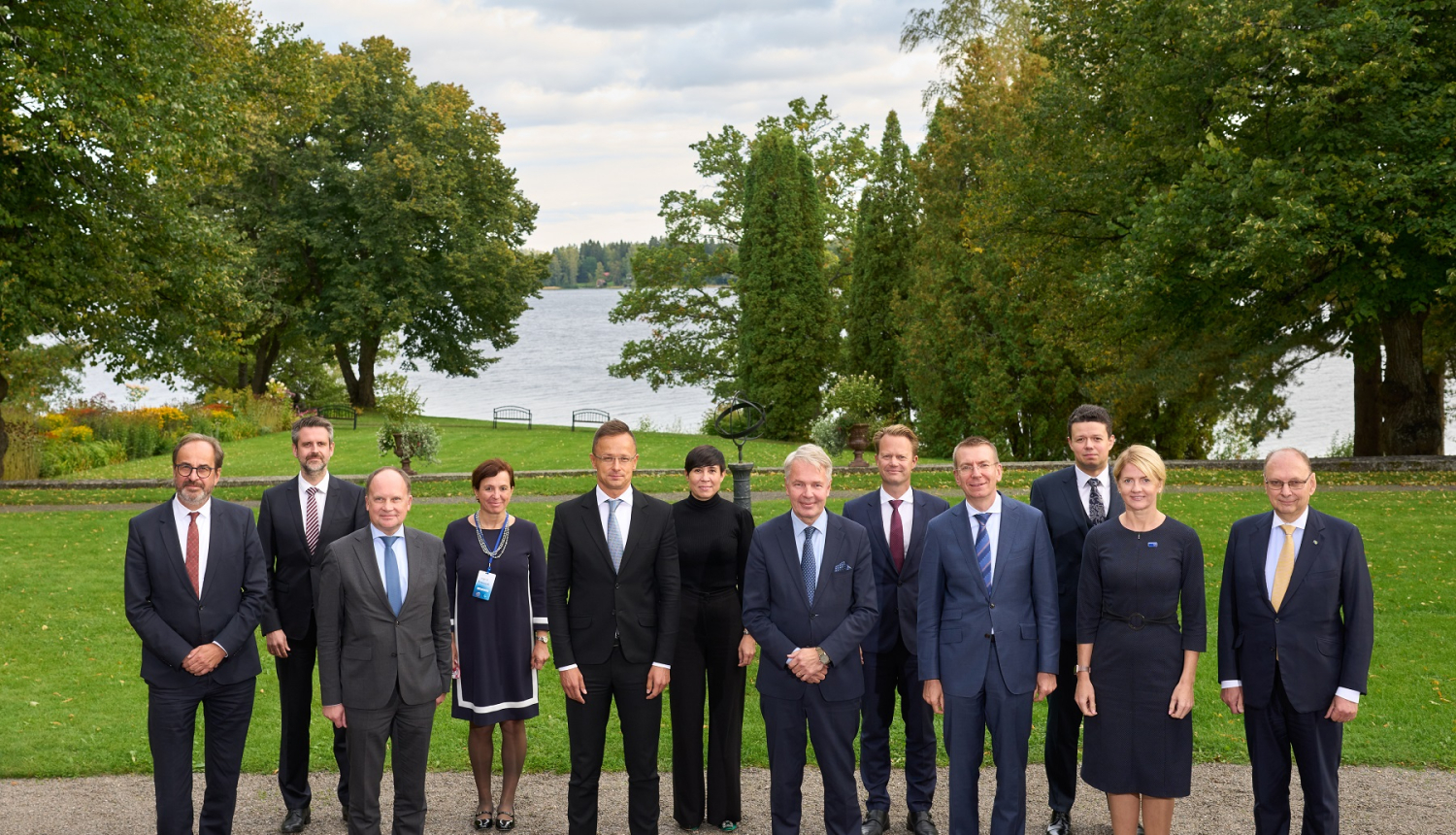On 14 September 2021, in Vanajanlinna, Finland, Latvia’s Minister of Foreign Affairs, Edgars Rinkēvičs, took part in the meeting of Foreign Ministers of the Nordic-Baltic Eight and the Visegrad Group (NB8+V4). On 15 September, Edgars Rinkēvičs represented Latvia at the meeting of the Ministers of Foreign Affairs of the Baltic States and Nordic countries (NB8).
The Foreign Ministers of the NB8 and V4 cooperation formats addressed a wide range of topics – energy issues, regional infrastructure projects, the importance of the Arctic, migration, relations with the Western Balkans in the context of enlargement of the European Union (EU), transatlantic relations, developments in Russia, Belarus and African regions such as the Sahel, the Horn of Africa, and Mozambique. The ministers also examined the possibilities for Roma communities and their members to influence regional and European policies, and discussed the climate diplomacy ahead of the 26th UN Climate Change Conference.
The officials were of the same mind that the use of renewable resources in energy production must be increased and developed. It is closely related to climate goals, which includes gradually discontinuing the use of fossil resources. Referring to the Nord Stream 2 Pipeline, the NB8 and V4 Foreign Ministers underlined the need for reducing dependency on energy supplies from third countries and for setting concrete strategic targets that are able to unite the EU. Latvia’s priority is the synchronisation of its electricity and gas sectors with the EU’s networks, the Latvian Foreign Minister noted.
In a discussion on regional infrastructure projects, the participants highlighted the Three Seas Initiative, the aim of which is to achieve the implementation of infrastructure projects important for the region. Edgars Rinkēvičs underlined that it is also essential to engage with other like-minded partners, including the Nordic countries and the United States of America.
The Ministers agreed that the role of the USA as a strategic partner remains unchanged and the transatlantic link with the US and Canada is of key importance. The focus rests on security issues and cooperation with NATO, including in the context of hybrid threats and cyber threats. It is also essential to facilitate trade contacts.
The participants expressed support for Latvia, Lithuania and Poland in relation to the hybrid operation deployed by Belarus at the border, deliberately organising the flow of third country nationals towards the EU’s external border. Given the lessons learned and in view of the serious situation in Afghanistan and conflicts elsewhere in the world, a comprehensive long-term approach should be taken to migration policy. It is essential to work on EU legislation concerning migration issues so that it also includes solutions to hybrid threat situations where third country nationals are maliciously instrumentalised, Edgars Rinkēvičs said. He added that the EU’s contribution is needed to the external border infrastructure and the work of Frontex should be strengthened.
The states expressed their concerns over persecutions in Belarus and restrictions imposed by Russia on the activities of the opposition and freedom of independent media. Commitment was voiced to providing support for the civil society in the two countries as well as continuing work on the expansion of sanctions against Belarus.
On 15 September, the NB8 ministers began their discussions with the issue of Afghanistan. Developments in the country are not indicative of an inclusive government being formed and raise concerns whether the rights of all the groups of society, especially women, would be safeguarded. The states were in accord that further ways should be sought to evacuate the Afghan people who had assisted the EU and NATO, and solutions should be sought to providing humanitarian assistance to Afghanistan. Edgars Rinkēvičs underlined that the EU ought to pay greater attention to cooperation with Central Asian countries in order to address the issues of Afghan refugees as well as helping to strengthen the region’s security.
The relationship with China was also discussed, placing the emphasis on the importance of a concerted policy based on the protection of the region’s shared values and on mutual solidarity. The Latvian Foreign Minister called for further coordination of EU Member States’ relations with China focusing on cooperation between the EU Member States and China in the “27+1” format. At the same time, it was noted that China is also an important partner in tackling global challenges such as climate change.
As they addressed issues related to climate change in the context of threat to national security, the Foreign Ministers were in agreement that the consequences of climate change could further aggravate the exiting vulnerability of political, economic and social systems. The unity and leadership of NB8 and the EU in climate action is essential, and achievements should pose an example to other regions worldwide. Cooperation between the UN and NATO should also be promoted. The Foreign Minister underlined that, in order to increase the ability of the countries to adapt to climate change, there is need for innovative research and solutions, which means engaging with researchers, scientists and entrepreneurs, who could have a major role in the development of those solutions.
The Foreign Ministers also discussed the state of affairs in the South Caucasus region and latest developments involving the Organisation for Security and Cooperation in Europe. Ahead of the United Nations General Assembly, the states also addressed UN-related topics, among other things, welcoming mutual support between the members of the NB8 and their cooperation in the organisation. At the conclusion, the Ministers reviewed critical issues in relation to the COVID-19 pandemic, underlining that lessons must be learned and coordination must continue in view of the changeable epidemiological situation. Together with other countries, Latvia supports solidarity concerning the donation of vaccines to make them available across the globe, Edgars Rinkēvičs underlined.
Background information
The Baltic and Nordic coperation format (NB8) comprises Denmark, Estonia, Finland, Iceland, Latvia, Lithuania, Norway, and Sweden. In 2021, the NB8 activities are coordinated by Finland. The Visegrad Group (V4) includes the Czech Republic, Hungary (currently holding presidency of the group), Poland, and Slovakia.
Photo: Ministry of Foreign Affairs of Finland.




